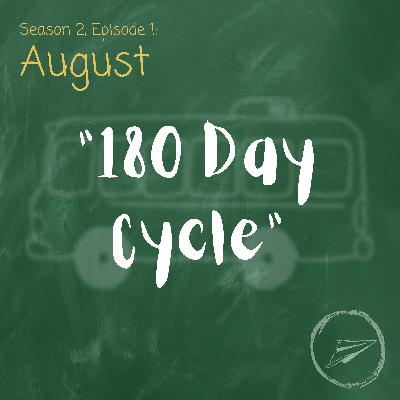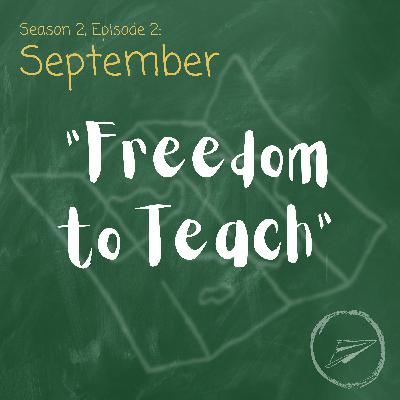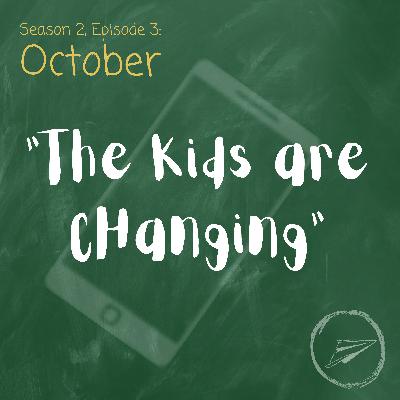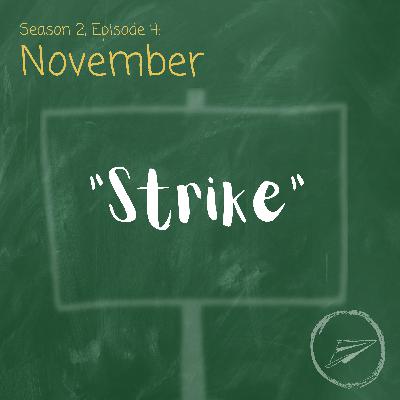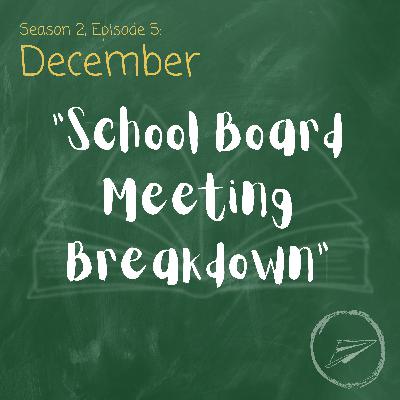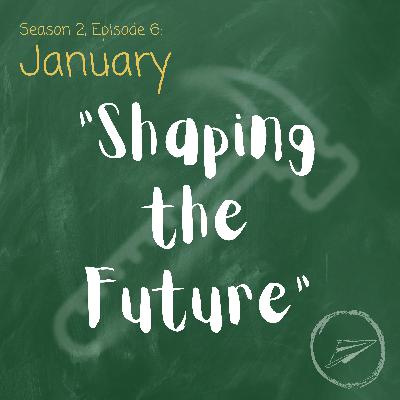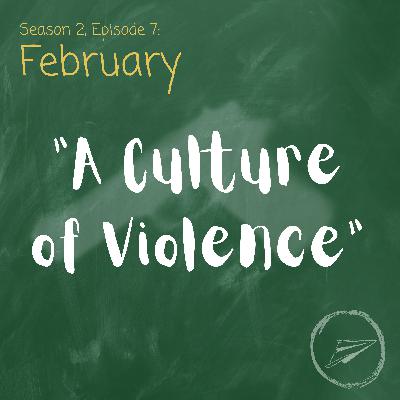4: Why Are We Here?
Description
What’s the purpose of education? If you were to ask 10 different people this question, you may get 10 different answers. Education shouldn’t be this complex, but getting people to come to a consensus on anything right now is a challenge. This can be a problem. If teachers are expected to meet ambiguous goals, it can lead to burnout and frustration. In this episode, we hear how conflicting values in education may be contributing to teachers’ decisions to leave.
Music:
Theme Song By Julian Saporiti
“Your Paradigm Dial” by Origami Repetika is licensed under a CC BY license.
“Room With a View” by Jahzzar is licensed under a CC BY-SA license.
“Business Getaway ” by Scott Holmes Music is licensed under a CC BY-NC license.
“I Was Different” by Ov Moi Omm is licensed under a CC BY license.
“Sunny Afternoon” by HoliznaCC0 is in the Public Domain.
Transcript:
In the spring of 2016, Julian Saporiti, the guy that made the theme song for this podcast, asked me if I wanted to help him teach a summer road trip class for the University of Wyoming. It was easy to say yes, and this class ended up being one of the most influential educational experiences that I’ve ever had.
Many of our students felt the same way. One of them, Sam Mallory, even talked about it in his graduation speech.
Sam Mallory: Two years ago about this time of year, I was officially enrolled in the most influential course in my college experience
And what made this class so significant likely had to do with the fact that we valued experience over product, which is a pretty non-traditional approach to a college course..
Our Syllabus included the following:
- Introductions: Julian Saporiti - Instructor /Guitarist. Charles Fournier Advisor/ Contemplation Mentor
Books: Jack Kerouak’s On The Road and John Steinbeck’s Travels with Charlie
- Music: Songs and lyrics for sing-alongs
- Assignments: This list included items like helping a stranger, keeping a journal, and dancing in the moonlight
- Safety Measures: Information about bear country, how to react if lost, and how to create a cross-draft in your vehicle to fart rather than holding it in and risking feeling sick
- Traveling Recommendations for Women: A list focused on hygiene and affirmations created by wife, Jennie, who is a brilliant traveler but opted to stay home to plan for classes and manage our new ornery dog
- Lastly: “Be Amazed. Be Present.”
We set out for two weeks across Wyoming, Idaho, and Montana. We danced to music by firelight in the Tetons under the Milky Way. I taught a pair of girls how to build a fire and when they asked what I thought about feminism, we read parts of The Vagina Monologues while lighting things on fire- one of those girls just wrote an award-winning screenplay. We observed the wildlife of national parks and saw some animals as well.
I love this model for education. A kind of structure of non-structure that gives students a chance to grow autonomy and learn on the go. It was an experience, and the students were, if not changed, greatly impacted by that course. Julian and I were too.
I tried to apply some of the elements of this course to my high school classes the next school year. I wanted kids to sit around a fire and have conversations, to worry less about grades or tests, and to focus on collaborative experiences that result in knowledge acquisition.
Then the school year started. My fire pit idea was struck down, and the weight of standardized assessments, and everything else settled into place. My idealism was smothered by bureaucratic reality. There’s nothing quite like having your grand plan for the new school year get deflated by October. And this brings me to a question that I have continuously returned to as a teacher when this happens - What’s the point of education? Why are we here?
The answer is ambiguous, and that uncertainty has led to conflict and confusion in education. So on the show today, we will ask “What’s the purpose of education?” Because if we can’t come to a consensus, teachers will continue to be expected to meet all of the competing thoughts about for what education is for. This is frustrating and adds to the stress and burnout that is leading teachers to find careers that might have more clearly defined parameters.
This is Those Who Can’t Teach Anymore, a 7-part podcast series exploring why teachers are leaving education and what can be done to stop the exodus. I’m Charles Fournier.
Here is part 4: “Why Are We Here?”
Why we educate kids seems like it should be an easily answered question. But in my conversations with all levels of people involved in and around education, there wasn’t a clear consistent answer:
Gary Martin:We have to work on their cognitive skills, you know, the critical thinking.
Christy Chadwick: I think we have this idea that the purpose of education is to raise the next generation. But now, it sort of feels like a control factor. It feels like we're just controlling society through education.
Caskey Russell: Fostering creativity in the students, critical thinking, removing kind of cultural blind spots, providing kind of an equal access all across the board, regardless of class race, getting an idea of community, American community as the kind of multicultural tapestry.
Lindsey Freeman: I mean, that's a big part of it is workforce development. But just citizens, I mean, our government or politicians, like everything that our world needs to continue starts in the classroom.
Jaye Wacker: Oh, my gosh, to protect a democratic republic. You know, pure and simple. We have to be educated, we have to be able to see through the bullshit, you know.
Jennica Fournier: I thought my role was to teach students about chemistry and biology. But I think sometimes there's the expectation that you're babysitting them. or that you're keeping them safe.
Shane Atkinson: I really tried to make it about the human connection.
Elizabeth Smith: The purpose of education is to train our people to be worker bees, and to have the skills necessary to devote their entire lives towards the betterment of a few elite versus the greater good of all.
It’s a lot, and that can be a problem. And there is a split between the ideal for what education is for and the reality that often stifles idealism. What we do know is that an educational system is inherently political because it reflects a country’s values. But what is valued in the US is continuously evolving and hard to pin down.
Education started in the Americas as a way to teach kids how to be a part of their community. Then it started to shift with colonization. Education went from being morality focused - teaching literacy so that people could read the Bible. To Democracy and assimilation focused - forcing people to fit a standard ideal while emphasizing being an active citizen. To worker focused - creating industrialized systems to set people up to enter the workforce. To academic and standards focused - standardizing curriculum with the intent to compete on the global scale.
But now, as demonstrated by the crazy political climate, what we value as a country is unclear, so what education should look like is also unclear.
This lack of clarity is landing at the feet of teachers. And having a job with no clear and agreed upon objective is frustrating. Should teachers be focused on standardized tests, on learning, on mental health, on social health, on morality, on graduation rates? It’s not clear.
But what is clear, is that having more of a shared value system would be valuable. A shared vision of what education is for. This would give teachers a clear objective that does not leave room for the petty arguments that are at the heart of so many educational dilemmas that are driving teachers out.
I think we can get there. I spoke with people from all over the political spectrum for this podcast, and I am certain that we can get to a shared set of values.
Juan Laden: Fundamentally, we need to make available within our teaching environment the understanding of other people and the possibilities for children to do so many things.
Juan Laden sat down with me at the Lander Bake Shop. I had set up a microphone and taped up a sign with two questions: Why are teachers leaving Education? And What is the Purpose of Education? Because I don’t want to hassle folks, I sat quietly with my dirty chai and waited for people to come to me. Juan sidled over in a dutch cap, still chewing on a pastry, and starting answering questions befor





